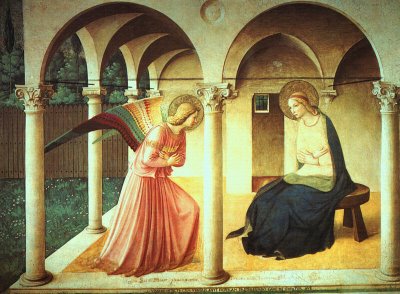1. But you believe in all that Mary stuff!
2. And you pray to saints!
3. And the pope! How can you believe the pope is infallible?
4. And how can you believe in transsubt....transsubstant...you know, that thing?
5. Why do you believe in all that stuff in addition to the Bible?
6. And why can't priests be women/married/not pedophiles?
7. Why do you have to confess to a priest? Can't you talk straight to God?
Did I miss any? Those are the biggies. There's also birth control (but I know Protestants who don't use birth control), purgatory, indulgences, an evident excess of "ritual," "so when did Catholics stop being Christians?" etc.
The first one is in some ways the hardest for me.
I really like Mary. Not in the sense that I'm a devotee of the rosary or anything like that. But I think it is cool that the one only-human human God chose to do the most important thing an only-human human has ever done was a woman, and not a particularly important woman on her own merit, but a regular person whose only distinguishing characteristic was that she was open to this great work that God was doing with her assent. Someone who experienced the parturition and the child-rearing and the passion of Jesus has known the entire range of human emotion, from supreme joy to utter grief, and the idea that she lives with God and hears our own expressions of joy and grief (well, if you believe in prayer to saints) is pretty cool.
So in a sense it is disappointing that the Church teaches that she was not, in fact, a completely ordinary person, but was distinguished from the moment of her conception by the absence of original sin. Thus Mary, who in Protestantism is seldom mentioned but is at least an accessible human being, becomes a distant, translucent, unimaginably holy person with a halo propped behind her head from the moment Anna and Joachim welcomed her into the world. The curtain of two thousand years and innumerable iconic Madonnas separates us from her again: She Is Not Like Us.
And then there is the fact that the United States has not a patron saint, but a patronal feast: The Immaculate Conception. It's December 8. It's a holy day of obligation. I kind of have to show up. The Immaculate Conception, as not quite every Catholic even knows, refers to Mary's conception without sin but otherwise in the usual manner, not Jesus' parthenogenesis. Which is why the feast day is December 8, not March 25.
March 25 is the Annunciation. I like the Annunciation. While I was in Europe in 2002, I collected Annunciations--I mean I saw them at museums and churches and bought postcards of them. This is my favorite, Fra Angelico's Annunciation at the monastery of San Marco in Florence. (This is, by the way, much worth visiting, as there are Fra Angelico frescoes in every cell. I only saw it for the last time in 2002, on my third visit to Florence, and I regret missing it until then.) (Larger version here.)

In a lot of Annunciations the angel of the Lord barges into Mary's room in a blaze of glory, and Mary shrinks back from the angel or bows her head in submission. Here, she's leaning forward inquisitively, "much perplexed," and the angel bends its knee just a bit to speak to her at eye level. Also, Mary does not look matronly, but rather young. And the angel has bird-wings with multicolored feathers, which rocks.
She is still wearing a dinner-plate halo, but for a moment Mary flits back down to earth and you think you could touch her hand, or the edge of her robe, and ask her to pray for you. And she'd say, "Isn't it amazing how God is with us? I'm still getting used to it myself."
The Incarnation (the name of my parish, whose patronal feast the Annunciation is), after all, is about God With Us. God shows up in earthly places: in human bodies, in bread and wine, in water; pops up in a song or an image that grabs us, wherein the fruit of human creativity reflects the creativity of God; speaks to us as we speak to each other. Et verbum caro factum est.
I think it'll take me a lifetime to be at ease with Catholic Mariology, but at least that's a start.

No comments:
Post a Comment